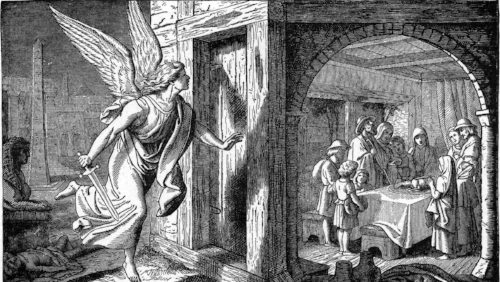Most of Bathsheba’s story is her silence. Let’s try to hear her voice and remember her ending: the queen-mother of Israel, clothed with strength and dignity, laughing over the graves of her abusers!
Don’t have sex with your mother. She’s your mother. Don’t have sex with your mother. (Leviticus 18:7)
Dear reader: We believe you should not have sex with your mom/dad, stepmom/dad, sister/brother, half-sister/brother, stepsister/ brother, granddaughter/son, aunts/uncles, daughters/sons-in-law, sisters/brothers-in-law, and that it is a pretty safe bet that you should avoid poly-amorous relationships with members of the same family, or your own family. Apparently, so does the Bible.
Setting shit on fire to get attention (2 Samuel 14:28-33): An Apology in Defense of Absalom
Lusting After Lovers with Donkey Genitals and Horse Emission (Ezekiel 23:20) and Ezekiel’s Obsession with Pornographic Metaphors
Perhaps we should remember the women in the room when Ezekiel first uttered these words. They had been forcibly marched from their homes. They had watched their families die. Some had been raped by the Babylonians. How did they feel? Perhaps we should remember the women who read these texts today, the women in our churches and homes, whose current situations are not too dissimilar to the women in exile by the rivers of Babylon. They have enough reasons to weep.
Unbridled Horniness (Most of Song of Solomon) [A Guest Card Talk]
“What the Bible is rather silent on is sexual relationships between two unmarried but committed and consenting people. Except in Song of Solomon. Here, we have a love story in its many facets. There is no judgement and no condemnation. And no guarantee of marriage. And we don’t know what to do with it. And that’s a tragedy.”
Not Checking Out Hot Virgins (Job 31:1) Or What Happened to the Evangelical Brand?
Adam wishing he had stuck with the sheep with "come-hither" looks (Genesis 3:12, Genesis 2:20)
How we respond to the word "misogyny" in regards to our game (hint: not well)
"Women: shut up in the church" (1 Corinthians 14:34) & "Head-coverings keeping angel-lust at bay" (1 Corinthians 11:6-10) [Guest Card Talk]
A concubine cut into pieces: Her severed remains FedEx-ed around the country (Judges 19:29)
Note: Yes, we are aware that Fed-Ex did not exist in the Iron Age. Really? That's your biggest problem with this card?
During the testing phase of this game someone came across this card and freaked out. The person was offended, indignant, opened a Bible, and then became horrified. "I think I'm more upset reading the Bible than your card."
The person was hurt by silence. That there is no condemnation in the text for what happened. No one says this is wrong.
This chapter of Judges is far, far worse than our 12 word summary, which only captures a moment in a dismal narrative of racism, betrayal, gang rape, and murder which occur long before this poor woman is dismembered. This passage is one every pastor, priest, and parent hide from fledgling follower of the faith, and every atheist apologist knows by heart in order to rail against the former. Both miss the point.
This is The Book of Judges: a book which, in part, records the moral decline of a nation. A book whose heroes become less heroic, less moral, as time marches on — compare Deborah, Ehud, and Gideon, to Samson, Jephthah and Abimelech. A book that repeats some version of the phrase, "in those days there was no king in Israel: every man did that which was right in his own eyes," especially towards the end, as things get worse and worse. (c.f. Judges 17:6, 18:1, 19:1, 21:25) So in truth, it should be no surprise that here, nearing the end of the book, we have this scene.
Not every tale in the Bible displays what is morally correct; some stories exist to condemn the horrific through silence, without commentary from the characters, the narrator, or God. The hearer/the reader knows that even if the foreboding words of missing kings was absent (19:1), no one who survives an encounter with this text needs an Aesopian moral at the end: an appearance of Moses, Jesus, or a South Park character, to tread upon the editorial stage and declare to the audience, "God thinks this is bad and you should too!"
In her book The Nakedness of the Fathers, the Jewish theologian/poet Alicia Suskin Ostriker places the judge Deborah in a modern-esque setting, leading a women's support group. While recounting stories from the Torah and this episode from the book of Judges and, Deborah explicates the silence:
"We are speaking of Jews not gentiles. Remember that among Jews these stories are not heroic but scandalous. A symptom of social chaos, when men forget to obey God as their Lord and King, and therefore fall into abominations.
For us it is tragic when women suffer."
No one in the story speaks up for the woman or comments on how she was abused. This is another biblical sign of how morally bankrupt the nation was, not an example of the misogynistic patriarchy. The writer knew this.
The condemnation is in the telling. The condemnation is in the silence.
But what do we know: we made this game and you probably think we're going to hell anyway.
http://www.bricktestament.com/judges/gang_rape_and_dismemberment/jg19_29a.html



![O Come, O Come Emmanuel (Isaiah 7:14) [An Advent Card Talk]](https://images.squarespace-cdn.com/content/v1/55a9a1e3e4b069b20edab1b0/1483161046976-X5VJE3CMP9T957O72EII/3d-wallpapers-light-dark-wallpaper-35822.jpg)





![Unbridled Horniness (Most of Song of Solomon) [A Guest Card Talk]](https://images.squarespace-cdn.com/content/v1/55a9a1e3e4b069b20edab1b0/1535733116824-420M6V1INS2N9LLH33OH/r923481_9613492.jpg)



!["Women: shut up in the church" (1 Corinthians 14:34) & "Head-coverings keeping angel-lust at bay" (1 Corinthians 11:6-10) [Guest Card Talk]](https://images.squarespace-cdn.com/content/v1/55a9a1e3e4b069b20edab1b0/1471403439167-JVYZP3DIZOVAMGG7YAOI/2013-10-21-UNwomenad2.jpg)
